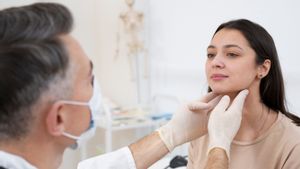JAKARTA - Disturbing tooth problems can cause dizziness. But sometimes, after visits to dentists can also cause headaches. Although statistics are certain about headaches caused after dental treatment, the value is not known. But headaches after dental treatment or dental cleaning are not uncommon, said Alla Al-Habib, MD, a neurologist at Texas Health Presbyterian Hospital Plano, driven from Livestrong, Monday, November 13.
Although disturbing, this is most likely not something serious. Here are some of the most common reasons why people can get headaches after dental treatment and what can be done to feel better.
Many people feel anxious going to dentists. In fact, about 36 percent of people in the US are afraid to do dental treatment, according to the Cleveland Clinic. This anxiety alone can make your head beat in pain.
"Stress and anxiety associated with visits to dentists can cause headaches because of tensions," says Dr. Al-Habib.
Lack of sleep can also be influential. If anxiety keeps you awake the night before your appointment with dentists, it can cause tense headaches in the future, according to the National Institute of Neurology Disorders and Stroke. Anxiety and sleep shortages can also trigger migraines for some people, according to NIH.
What needs to be done is, praise yourself for maintaining mouth health even though you are afraid. To help make your next meeting appointment more comfortable, convey your fear to the dentist. They will adjust their care or work speed.
If you feel stressed or anxious during your visit, you may wrap your teeth too strongly without realizing it, according to the Mayo Clinic. You could do it while in the waiting room, before the doctor does the cleaning, or after your cleaning or procedure is complete.
"This can suppress the jaw muscle so that it causes headaches," said Dr. Al-Habib.
Try other stress reliever techniques at the next meeting appointment, such as squeezing stress balls or visualizing yourself in a fun place to let go, according to the American Dental Association.
While in the dentist, you often have to open your mouth wide for a long time. However, holding this position for a long time can make your jaw tense and cause the muscles around you to seizure, causing headaches.
"The temporomandibular (TMJ) satire connects the jawbone to the skull, and the excessive strain on this joints can cause headaches and tensions," said Dr. Al-Habib.
These headaches often feel like there is a tight bond around your head and you may also feel your jaw hurt or tired.
Put a warm compress on the jaw that hurts for 15 to 20 minutes. This can help relax muscles and reduce inflammation. And help relieve headaches because of tensions.
SEE ALSO:
In rare cases, the numb medicine that dentists use on the mouth before patching, installing dental crowns, or other procedures can cause headaches.
About 2 percent of people experience headaches after receiving numb medicine for dental treatment, according to a December 2021 review of the "Journal of Dental Anesthesia and Pain Medicine".
These drugs often contain ingredients such as norepinephrine, which can cause a temporary spike in blood pressure that can cause headaches, says Dr. Al-Habib.
Headaches due to lethal injections usually only last for a while and will disappear on their own, says Dr. Al-Habib. You can speed up the process by drinking a lot of water and resting in a dark and calm room to minimize sensory stimulation, he added.
The English, Chinese, Japanese, Arabic, and French versions are automatically generated by the AI. So there may still be inaccuracies in translating, please always see Indonesian as our main language. (system supported by DigitalSiber.id)

















